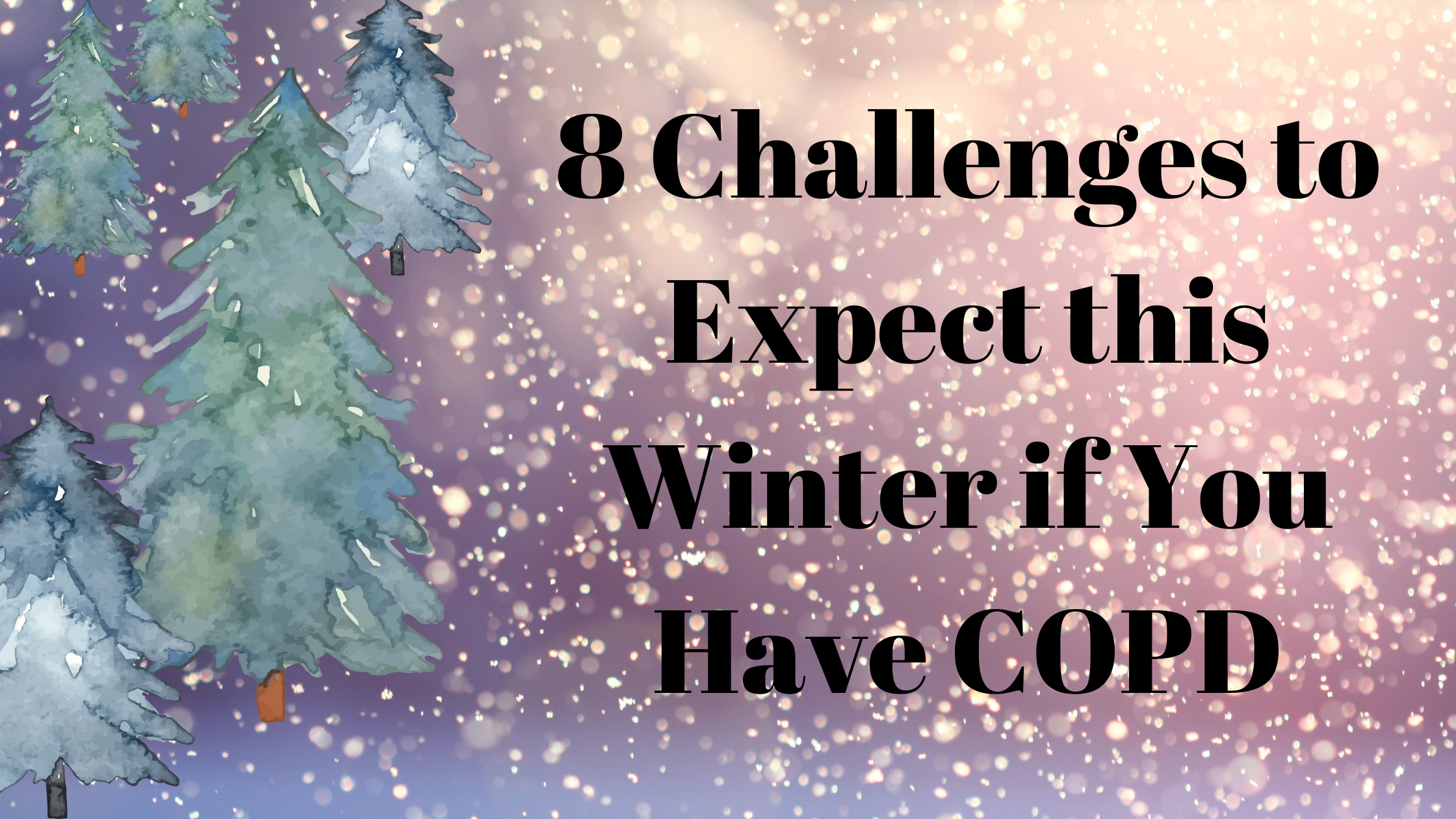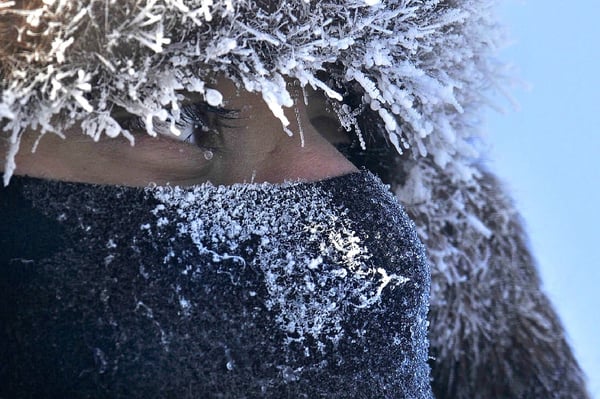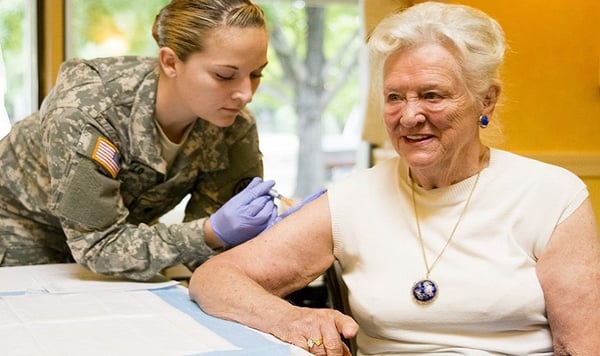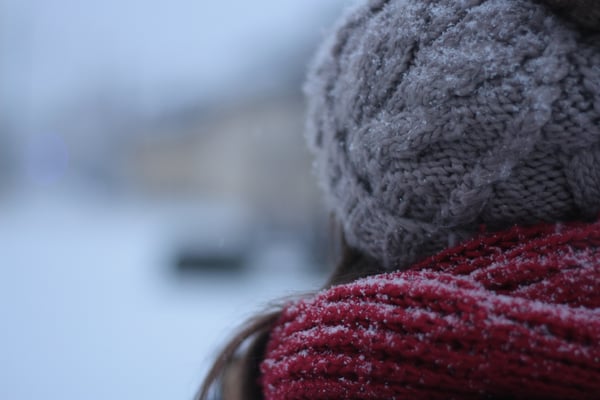
If you have COPD, then you know that all kinds of unexpected things can affect your symptoms and make them worse. Even minor respiratory irritants, like fragrances, air pollution, and dry air, can make it more difficult to breathe.
That's why, when the seasons shift, it's important to understand how the change might affect your COPD. This is particularly true when moving from the mild fall season into harsh winter conditions.
As the cold weather sets in, you should be aware of all the potential COPD hazards that winter weather brings. Then, you will be better prepared to manage your symptoms and deal with the challenges when they come.
In this guide, we're going to walk you through all of the most common challenges COPD patients face during the winter time. We'll warn you about winter respiratory irritants, weather hazards, and other seasonal conditions that could make your symptoms worse.
We'll also show you what you can do to prepare for these problems and minimize their impact on your lungs. That way, instead of spending the winter months struggling to manage your disease, you can use the tips and tricks in this guide to overcome winter challenges and breathe much better this season.
Things You Should Know and Prepare for This Winter if You Have COPD
Extra Difficulty Breathing Winter Air
You might have noticed on your own that breathing cold, winter air can make it more difficult to breathe. This can happen to healthy adults but it is particularly problematic for people with COPD.
That's because winter air is usually far from the optimum temperature and humidity that your lungs and airways prefer. Cold, dry air is much harsher to breathe than warmer, humid air, and it can irritate your lungs and constrict your airways as you breathe.
When the humidity is very low, the dry air sucks the moisture out of your airways. This thickens your mucus and irritates the tissue that lines your nose and airways, triggering symptoms like coughing and shortness of breath.

The cold temperature of the air alone can also be a problem, especially when you first go outside after breathing warm indoor air. When you take a breath and suddenly bring frigid air into your lungs, it can trigger bronchospasms, which constrict your airways and make it harder to breathe.
The best way to avoid these problems is to avoid breathing the cold, dry winter air as much as you can. That means staying indoors when weather conditions are bad and using simple techniques to warm up the air that you breathe.
This is easier to do if you check your local weather forecast regularly and plan ahead for upcoming conditions. Pay special attention to the temperature and humidity, and be prepared to take extra measures to manage your symptoms on particularly harsh days.

When you do have to go out in the cold, you can make the air more breathable by covering your nose and mouth with a scarf or a special cold-weather mask (called a CT mask). This will trap heat and moisture from your breath, helping to warm and humidify the harsh outside air so it is more comfortable to breathe.
Here are some tips to help you breathe better in the frigid winter air:
- Avoid going outside during the coldest parts of the day.
- Stay indoors during inclement weather and when the temperature is very cold.
- Don't try to exercise outdoors when the air is too cold or dry.
- Wrap a scarf or cloth around your mouth to breathe easier in cold air (or wear a CT mask). https://lunginstitute.com/blog/ct-masks-for-copd/
- If you use oxygen therapy, use a humidifier bottle to moisturize the air that comes from your oxygen source.
- Practice pursed-lips breathing when you feel short of breath in cold weather.
- Continue taking your maintenance medications exactly as your doctor advises.
- Always bring your rescue inhaler with you whenever you leave your home during the winter, especially during harsh weather.
Danger During Cold and Flu Season

Along with winter comes cold and flu season, that dreaded time of year when contagious respiratory illnesses reach an all time high. This time of year poses a special danger to people with COPD, who are more prone to getting sick.
While a common cold might not seem like a big threat, a minor illness like a cold can turn into something much more serious if you have COPD. Any kind of respiratory illness can trigger severe COPD symptoms and lead to more serious exacerbations.
COPD exacerbations are difficult to treat and, in the worst cases, can cause life-threatening complications. Even minor COPD exacerbations can make you feel very sick and take a major toll on your life, disrupting your ability to exercise, work, and do other normal activities.
COPD exacerbations can also take a very long time to recover from, and in some cases can result in permanent lung damage that makes your symptoms permanently worse. That's why it is so important to practice good hygiene, keep your immune system healthy, and avoid contagious illnesses if you have COPD.
Unfortunately, studies show that people with COPD are more than twice as likely to experience an exacerbation during the winter months. That means you need to take extra special precautions during this season to avoid getting sick.
That means doing what you can to bolster your immune system and keeping your COPD symptoms under control. It also means coming up with strategies to help you avoid germs and germ-heavy environments, especially during peak cold and flu season.

The best way to do this is to keep up-to-date with your vaccinations and be diligent about your personal hygiene. Especially when you're out in public, be cautious about what you touch and avoid transferring germs from your hands to your eyes, nose, and mouth.
Wash your hands often, avoid people who are sick, and be especially cautious in crowded places. If you use oxygen therapy, you should be extra diligent about keeping your medical equipment (like your nasal cannula) clean during the winter.
Here are some additional tips to help you prepare for cold and flu season:
- Get your yearly influenza vaccination.
- Ask your doctor if you need a pneumococcal (pneumonia) vaccine.
- Take all of your medications as directed by your doctor and take care not to miss a dose.
- Know the early signs of a COPD exacerbation and what you should do when you notice your symptoms starting to get worse (follow your COPD action plan).
- Practice proper personal hygiene at home and especially in public.
- Wash your hands often and avoid touching your face, especially in public places.
- Avoid attending crowded events during cold and flu season.
- Do your best to stay away from anyone who has a contagious illness, including avoiding houses or events where someone there is sick.
- Quit smoking to reduce your risk of respiratory illnesses and infections.
Extra Fatigue and Worse Symptoms in Cold Weather
.png?width=155&name=thermometer-151236_1280(1).png)
Even if you protect your lungs from pollution and dry air this winter, the bitter cold can still bring you down. Cold temperatures alone can have a noticeable effect on COPD symptoms, and this effect can even last for several days.
Studies show that breathing cold air can hurt your lungs and reduce their ability to function by a measurable amount. It causes your airways to constrict and can even damage the tissue lining your airways, making it more difficult to breathe.
However, even just being in the cold air—not even breathing it—can reduce lung function and worsen COPD symptoms. Even short periods of exposure to cold weather can trigger breathlessness, fatigue, and a significant increase in the number of COPD patient hospitalizations.
These effects are likely caused, at least in part, by how your body reacts to getting cold. In an effort keep your core temperature from falling, your body has to work harder and burn extra energy to stay warm.
When you're exposed to very cold temperatures, this can drain your energy levels and cause you to feel fatigued. It also requires your lungs to work harder to keep pace, which puts extra strain on your respiratory symptom and makes it more difficult to breathe.
Many studies have linked worsened COPD symptoms with cold outdoor temperatures and even cold temperatures indoors. Some studies show that cold temperatures can double COPD patients' risk for exacerbations and even increase their risk of death.
That's why you should be prepared to experience worsened COPD symptoms when the temperature drops this winter. That means keeping your rescue inhaler handy and making sure you have a warm place to go when extremely cold weather hits.
During the coldest months of the year, keep a diligent eye on your local weather forecast so a cold snap doesn't take you by surprise. When you're expecting extra chilly weather, make preparations to stay warm and avoid spending time outdoors.
When you do go out, don't take any chances and always dress appropriately warm. Even if it adds a few minutes to your usual routine, bundling up is your best defense against the harsh winter temperatures that could worsen your COPD.
Most importantly, make sure you have a reliable heating system that can keep your home at a comfortable temperature all winter. You should also make sure you have somewhere to go if your heater breaks down or your house loses power during a storm.
Here are some tips for combating cold temperatures this winter:
- Avoid exposing yourself to cold weather and spend as little time outside as possible on especially frigid days.
- Always check the weather before you leave the house and wear appropriately warm and comfortable clothes.
- Wear layers so you can stay warm in the cold but also stay comfortable indoors by removing unnecessary layers.
- When you do go out in the cold, cover as much skin as possible; don't skimp on cold weather gear like hats, scarves, mittens, leg warmers, and earmuffs.
- Avoid clothes that are too tight—especially around the chest—because they can restrict your movement and breathing.
- Make sure to keep your house at a warm, comfortable temperature at all times during the winter.
- Consider changing your plans so that you can stay indoors during particularly cold or harsh weather. (e.g. work from home or reschedule other outings and errands)
- Make a special effort to avoid going out in cold weather when you are not feeling well or are experiencing a COPD exacerbation.
- Be prepared to use your rescue inhaler more often and bring it with you anytime you leave your home.
- Keep extra food and supplies at home just in case cold or inclement weather keeps you home-bound for an extended period of time.
- Ask a friend or family member to check up on you during cold spells and winter storms
Fewer Exercise Opportunities

If you have COPD, you shouldn't exercise outdoors when the weather is bad or the air is cold and dry. This means you will need to do the majority of your physical activity indoors during the winter months.
Exercise is one of the best ways to keep your heart and lungs healthy, which is why it's vital to keep it up all throughout the year. Even though you might be tempted to hide away and hibernate this winter, you shouldn't let the cold weather get in the way of your exercise goals.
Without outdoor sports and activities to keep you active, you might need to be more creative and deliberate with your workouts. Be prepared to rework your exercise routine and find new ways to get physical activity indoors.

For example, if you are used to walking outdoors for exercise, you could walk on a treadmill or indoor track at the gym instead. You could also take walks in a large public building in your area, such as an indoor mall.
You might also consider joining an exercise class at a local gym or fitness center. Many people find that participating in this kind of scheduled group activity makes it easier to stay motivated and stick with an exercise routine.
If you'd like, you can even work out in your own home without needing any expensive equipment. All you have to do is find a home exercise routine you like, whether it's online, on DVD, or a routine you devise yourself.
Don't ever think that staying inside means that you can't also stay active. Winter exercise opportunities are essentially endless, even though they might be tricky to find.
Here are some tips to help you get more exercise this winter:
- Join a gym where you can walk and do other exercises indoors.
- Clear some floor space in your house to practice simple indoor exercises at home.


